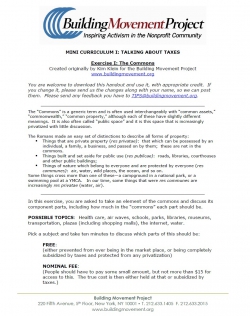The Indispensable Public Space
The Building Movement Project uses the shorthand “TIPS” (The Indispensable Public Space) to describe all our work related to exploring, enlarging, understanding, preserving and illuminating public space. This curriculum explores our complicated relationship to taxes, and thus, our very mixed feelings about how “public space” is to be financed.
TIPS is a play on words. It is a redemption of the word used to describe the ill-fated TIPS program introduced by John Ashcroft that asked neighbors, meter readers, and mail carriers to report any suspicious activity they spotted as they went about their daily life. The public was outraged by the idea and the program was dropped.
What is Public Space?
Public Space is anything that belongs to the public, and is financed by the public for the use of whole public. For example: public schools, parks, baseball fields, and the like which are free and open to the public; museums, theaters, swimming pools, and tennis courts, which may charge a nominal admission but which are subsidized by the public through taxes and are supposed to serve a broad swath of the public; and police and fire departments. Public Space also includes fresh air and fresh water, access to a wide range of information through the airwaves, and access to the political process through voting.
This public space is rapidly being privatized. In order for “public” schools to have art and music programs, and sometimes even libraries, parents must raise the money privately. In order for national and state parks to balance their budgets, they must charge admission fees; ditto for museums and artistic venues. And the list goes on. Nonprofits bear the brunt of this privatization as we must raise money privately to continue our work for the public good.
The Role of Public Debate
We often say people are entitled to have an opinion, but what we often don’t articulate is that people are entitled to get enough accurate information and participate in enough conversations to form an opinion. Further, that having formed an opinion, public debate becomes the ability to listen to and recognize the opinions of others. The goal of public debate is not unanimity, but giving voice to the range of thoughts in the society, and allowing for some things to remain unknown and unclear. True public debate creates a fragile and delicate space where everyone listens and feels heard. Violence of any kind, including personal attacks, name calling, snide comments, and verbal jousting, have no place in public debate.
We’ve developed the first of three mini-curriculums for pursuing public conversation and debate with the goal of creating broader appreciation and understanding of “the commons.” Further suggestions for how to structure public conversations are forthcoming.
This first mini-curriculum mostly concerns taxes, and is presented below. You are welcome to use these exercises and modify them to make them more useful to your situation. Please give appropriate credit the the Building Movement Project.

